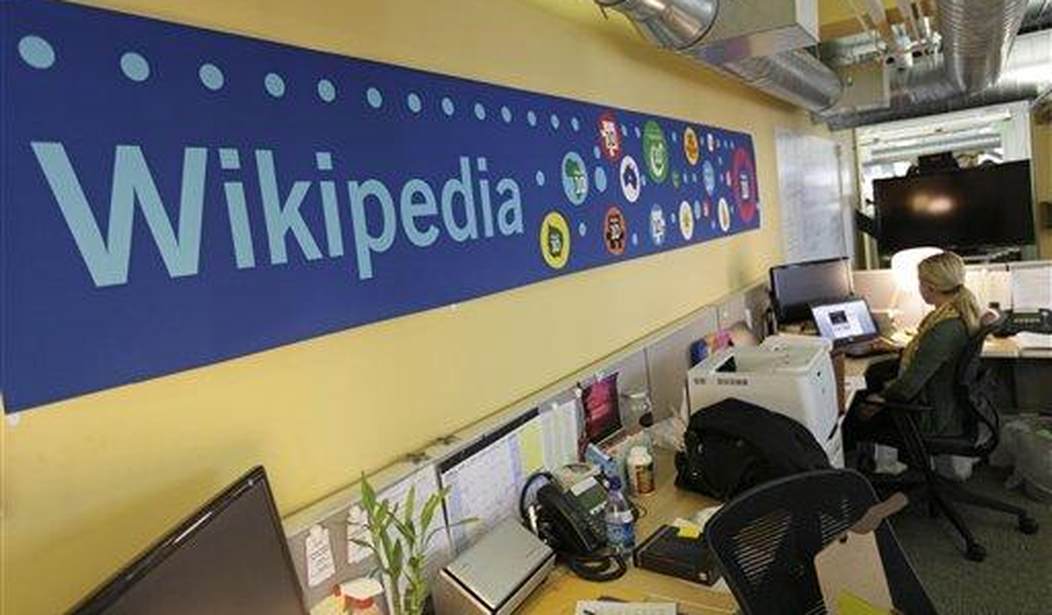A few days ago, the government of Pakistan charged my website, Jihad Watch, with blasphemy. I can’t say that I was particularly shocked at this development: I have stood for years against the efforts of Pakistan and other Islamic entities to intimidate the West into curtailing the freedom of speech and adopting Sharia blasphemy laws by outlawing images of Muhammad, the prophet of Islam. Standing up for the freedom of speech is something that is certain to annoy the good folks in Islamabad. But now the same Pakistani government has taken aim at hyper-woke Wikipedia, accusing the Leftist Big Tech giant of hurting Muslim sentiments. How crestfallen they must be today in Wikipedia’s San Francisco headquarters: for years they’ve been smearing critics of Islam and whitewashing Islamic doctrine and history, and this is the thanks they get.
The Associated Press reported Monday that the Pakistan Telecommunications Authority “blocked Wikipedia services in the country for hurting Muslim sentiment by not removing purportedly blasphemous content from the site.” The Authority had given Wikipedia 48 hours to remove this allegedly blasphemous content, and when the online encyclopedia did not comply, they slapped on the ban. Malahat Obaid of the Pakistan Telecommunications Authority explained matter-of-factly, “Such things hurt the sentiments of Muslims.”
Well, we can’t have that. It must be nice to expect the whole world to cater to your hurt feelings and jump to remove the source of the hurt, but Malahat Obaid and her colleagues are likely so used to authorities in the West taking exactly that course of action that they’re shocked Wikipedia isn’t likewise rushing to make them feel better. For years, Wikipedia has followed the Left’s warmly favorable line on Islam, which as a non-Christian, non-Western, and largely non-white religion checks all the boxes for something the Left would love. Add in the fact that Muhammad, the prophet of Islam, enjoined obedience to the ruler in virtually all circumstances, and Islam coalesces nicely with the Left’s increasingly open authoritarianism.
Wikipedia’s far-Left bias has been noted almost from the moment the site began. Since it incorporates material from earlier encyclopedias, it has some value for material that isn’t remotely controversial, but it’s absolutely worthless for any political or otherwise controverted matter unless you are looking for the Left’s line on a given issue. But perhaps out of some residual sense of responsibility before the public, to keep up some nominal appearance of objectivity, or simply out of carelessness, it does contain material that some Muslims would find highly offensive. In the entry on the initial controversy over cartoons of Muhammad printed in a Danish newspaper in 2005, it includes the cartoons themselves, although at such a small size that only the most fanatical blasphemy hunter would be able to see anything offensive.
Related: Wikipedia Goes After Anti-Grooming Activists
Yet despite Wikipedia’s fastidiousness, it has now managed to become “Islamophobic” anyway. And the consequences could be quite serious. AP notes that “under Pakistan’s controversial blasphemy laws, anyone found guilty of insulting Islam or its figures can be sentenced to death, although the country has yet to carry out capital punishment for blasphemy. But even allegations of the offense are often enough to provoke mob violence and even deadly attacks. International and domestic rights groups say that accusations of blasphemy have often been used to intimidate religious minorities and settle personal scores.” Wikipedia’s CEO is unlikely to get lynched and the corporation is unlikely to suffer much from the Pakistan ban. But that ban could result in an even more pronounced Leftward tilt at Wikipedia, with further restrictions on speech so as not to transgress Sharia blasphemy laws and further calumnies and smears in the bios of critics of Islam.
The Wikimedia Foundation responded to the ban on Saturday: “We hope that the Pakistan government joins us in a commitment to knowledge as a human right and restores access to @Wikipedia and Wikimedia projects promptly, so that the people of Pakistan can continue to receive and share knowledge with the world.” That’s almost certainly not going to happen, barring massive societal change in Pakistan. In the final analysis, neither the government of Pakistan nor the top dogs at Wikipedia are really interested in sharing knowledge with the world. They’re both in the propaganda business, with competing but ultimately contradictory products. The Pakistani ban is not going to make Wikipedia awaken to the glories of the freedom of inquiry and of unbiased analysis. It’s likely only to become even less reliable than it is now.










Join the conversation as a VIP Member